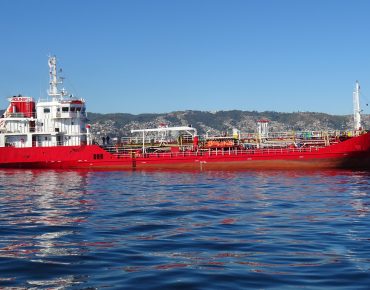
Carlos Cornelius, manager in charge of this Business, talked about the challenges of the Company in the sector.
Since 1976, AGUNSA has offered services in providing lubricants to vessels. In 1991, the company acquired her first tanker barge (“Rio Cisnes”), which was later sent to operate in the Port of Buenos Aires, Argentina.
In 2013, AGUNSA consolidated itself as a supplier of lubricants and fuels, occupying the position that Terpel had had in the market, and closing a contract with ENAP, which enabled to secure the supply of necessary IFO to compete.
On that date, it also coincided with the withdrawal of PMC (Glencore) from the local market, allowing AGUNSA to obtain greater participation and to become one of the two actors that today actively participate as physical suppliers in Chile, both in delivery via barge or by truck or pipelines, throughout the length of Chile.
Carlos Cornelius, corporate manager for the General Representation and Agencies division for AGUNSA, explained to MundoMartimo that at that time, ENAP had a higher volume of IFO than it currently has, and there was a broader demand than the present.
The executive details that the refinery, with a greater availability of product – around 50,000 tons per month – offered a more competitive price to the physical providers.
In 2015, with the hope of complying with the protocols, quality standards, security and Service; AGUNSA acquired the Vessel, “Agunsa Capella,” which has a capacity of 2,000 tons and which currently operates principally between the Quintero and Concepcion Bay zone.
A turn in the Market
During the last 4 years, the market has suffered some alterations. The volumes of fuel that are available to be delivered by the refinery, has begun to gradually decrease, consequently generating an increase in the price of the product. “They, in their refinery processes, began to have less residual product, which is more convenient for them economically, adjusting their supply – more or less – to 30,000 tons per month,” says Carlos Cornelius.
He also added that the demand has begun to adjust, not only due to the prices versus the neighboring markets, but also due to the consolidation of the shipping industry, mainly with containers. Considering the geographic position of the country, “Chile is the last destination and has by definition greater logistical costs because it refines imported products,” stated the executive, emphasizing that “Chile has become a filling market for the bunkering industry.”
He points out that “consolidations are never good for any supplier, you have fewer actors and ones that are larger and greater bargaining power. This has also affected us as there are less vessels and less demand.”
Also within this lower demand are the advances in technology. “The vessels are requiring less fuel, because they are more efficient and consume less,” states Carlos Cornelius, who emphasizes that there is already a 10% decrease in demand compared to this time in 2016, generating less sales, adjusting the margins downwards and negatively affecting the business of physical bunkering.
Challenges in a Harsh Context
“We aim for a 30% share of the market, at reasonable margins that allow us stability with the delivery of a good product, service and adequate logistics to supply that market share,” emphasizes the AGUNSA executive, who stresses that “more than monopolizing the market and volume, we are interested in being a flexible and reliable actor with regards to the customers’ requirements.”
Carlos Cornelius, argues that at AGUNSA “we are very cost efficient. We are fully integrated and we are able to achieve high levels of operational efficiency, but what complicates us more than anything, is the cost of the product, the continuous access to the cargo by the refinery, and the sales prices that has been diminished by the competition that exists currently in the local market.”
New vessel in Argentina
However, this scenario does not mean that AGUNSA stops thinking about developing the bunkering business and looking at existing growth options in South America, where it already has a presence in Argentina and looking for new markets in Peru, Ecuador and Colombia. “We are always evaluating new markets, both in Chile and overseas,” assures Carlos Cornelius.
In fact, he adds, “we recently incorporated a new tanker, the Serra Theresa, for bunkering supplies in Argentina – which joins a fleet of three vessels – in conjunction with its reputable partner, “Risler,” with which they control an important percentage of the Argentinian bunkering market.”
Monday, October 16th, 2017
Source: MundoMaritimo
xhamster,
xvideos,
porn,
xnxx,
sex việt,
Phim sex,
mp3 download,
MP3 download,
Free brazzer,
Nike Air Max Classic,
Songs In Ursa Major,
xinh,
phim xnxx,

